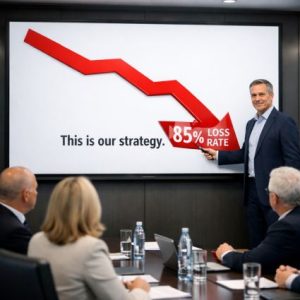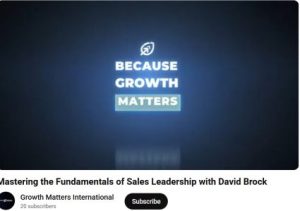Partners in EXCELLENCE - Making a Difference
"Toto, I’ve a feeling we’re not in Kansas anymore…"
Dorothy in the Wizard Of Oz
Most of us experience those feelings of uncertainty today. Everything is changing, at rates we’ve never experienced. Complexity, ambiguity, overwhelm, uncertainty, and ambiguity dominate everything we and our customers do.
It is in this complexity that sellers and leaders create real opportunity. Making sense of what we and our customers face, helping them understand and simplify, moving forward to take action.
Partners In EXCELLENCE works with leaders and sellers in mapping the journey from complexity to simplification. We help them OutSell and OutPerform all others.
Latest Posts
You Can Lead A Seller To Water, But You Can’t Make Them Think!
We’ve built something remarkable in modern sales organizations. Over the past two decades, we’ve constructed an elaborate infrastructure: scripts, playbooks, sequences, talk tracks, battle cards, […]
Read MoreDiscovery Isn’t Just For Selling
We’ve spent decades drilling the importance of discovery into every sales methodology. We teach our people that you never lead with a pitch. You never […]
Read MoreDo I Care?
Mitch Little read my recent post on competing to lose 80-85% of our deals and responded with something that stopped me: “Your analysis is spot […]
Read More“We Are Competing To Lose 80-85% Of Our Deals!”
Imagine a CRO presenting to the exec or investor team. This CRO is presenting their GTM strategy, and a key statement in that strategy is, […]
Read MoreRecent Podcasts
Is “Good Enough” Good Enough, Fred Copestake Sales Today Podcast
Fred Copestake is a great friend. We had a fascinating discussion! Below is his description of this discussion: In this episode of The Sales Today […]
Learn MoreHow To Crush Mediocrity In Sales, The Sales Hunter Podcast
Mark Hunter invited me to have a fascinating discussion about my new book, Is “Good Enough” Good Enough, Mindsets and Behaviors For Sales Excellence. Here’s […]
Learn MoreThe Inquisitor Podcast, Discussing: Is “Good Enough” Good Enough
I had the great good fortune to talk to Marcus Cauchi. We started talking about my latest book, Is “Good Enough” Good Enough, Mindsets and […]
Learn MoreRecent Videos
Is “Good Enough” Good Enough, Fred Copestake Sales Today Podcast
Fred Copestake is a great friend. We had a fascinating discussion! Below is his description of this discussion: In this episode of The Sales Today […]
Learn MoreMastering the Fundamentals of Sales Leadership with David Brock, Growth Matters Webcast
The most impactful sales leaders are the ones who return to the fundamentals. In this episode, Daniel sits down with David Brock, bestselling author of […]
Learn MoreMaximizing Sales Performance In A Changing Environment
In this episode of the 1% Edge Podcast, Carlos Nouche and Dave Brock discuss the evolving role of sales managers in today’s business environment. They […]
Learn MoreWe live in a world of unprecedented change and uncertainty. At the same time, it offers each of us the opportunity to rethink everything we do, individually and organizationally. We have the opportunity to innovate and transform---ourselves, our organizations, our customers, and our markets. We have never seen a more exciting time in business and selling!
Partners In EXCELLENCE has had the privilege of working with individuals and organizations in mapping their innovation and transformation experiences, helping them OutSell and OutPerform all others.
As you embark on your own changes, reach out to us to help you think about the opportunity and how you move forward in making it happen!







